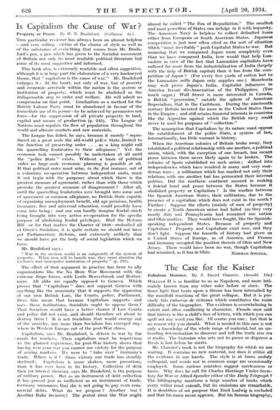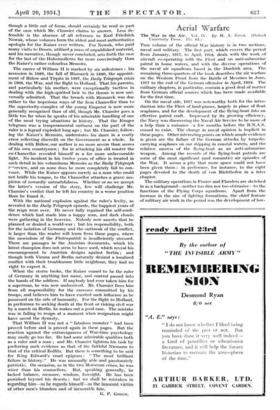The Case for the Kaiser
Fabulous Monster. By J. Daniel Chamier. (Arnold. 15s.)
WILLIAM II is as familiar to us as Napoleon, and more inti- mately known than any other ruler before or since. The fierce light that beats upon a throne has been intensified by the manifold reactions of the great collapse. But it is pre- cisely this embarras de richesses which constitutes the main difficulty of the biographer. The evidence is overwhelming in extent and often conflicting in character. Froude, once said that history is like a child's box of letters, with which you can spell out any word you like. Of course you can ; but that is no reason why you should. What is needed in this case is not only a knowledge of the whole range of material, but an un- bending determination to discover and tell the truth sine ira et studio. The historian who sets out to prove or disprove a thesis is lost before he starts.
Mr. Chamier's book is not the biography for which we are waiting. It contains no new material, nor does it utilize all the evidence in our hands. The style is at times unduly colloquial, and words not in common usage are occasionally employed. Some curious mistakes suggest carelessness or haste. Why does he call Sir Charles Hardinge Under-Secre- tary for War or Alfred Spender editor of the Daily Telegraph ? The bibliography mentions a large number of books which every writer must consult, but its omissions are remarkable. It is doubtless of set purpose that Emil Ludwig is excluded and that his name never appears. But his famous biography,
though a little out of focus, should certainly be read as part of the case which Mr. Chamier claims to answer. Less de- fensible is the absence of all reference to Karl Friedrich Nowak, whose volumes form the ablest and most authoritative apologia for the Kaiser ever written. For Nowak, who paid many visits to Doom, utilized it mass of unpublished material, and his" narrative, though never concluded, sets forth the case for the last of the Hohenzollern far more convincingly than the Kaiser's rather colourless Memoirs.
The career of William II is marked by six milestones : his accession in 1888, the fall of Bismarck in 1890, the appoint- ment of Billow and Tirpitz in 1897, the Daily Telegraph crisis in 1908, the War, and the flight to Holland. That his parents, and particularly his mother, were exceptionally tactless in dealing with the high-spirited heir to the throne is now uni- versally admitted. That the breach with Bismarck was due rather to the imperious ways of the Iron Chancellor than to the superiority-complex of the young Emperor is now more generally recognized than of old, though Mr. Chamier goes a little too far when he speaks of his admirable handling of one of the most trying situations in history. That the Kruger telegram was a temperamental outburst on the part of the ruler is a legend exploded long ago ; but Mr. Chamier, follow- ing the Kaiser's Memoirs, understates his.Share in a costly error reflecting discredit on the Government as a whole. In dealing with Billow, our author is no more severe than scores of his own countrymen ; for in attacking his old master the ex-Chancellor revealed himself in a far more unfavourable light. No incident in his twelve years of office is treated in such detail in his voluminous Memoirs as the Daily Telegraph i—Ferview, and on none does he more completely fail to con- vince. While the Kaiser appears merely as a man who could not bridle his tongue, to the Chancellor attaches a grave sus- picion of cowardly untruthfulness. Whether or no we accept the latter's version of the story, few will challenge Mr. Chamier's verdict that he left his country in a worse position than he found it.
With the national explosion against the ruler's levity, as revealed in the Daily Telegraph episode, the happiest years of the reign were over. He never fully regained the self-confi- dence which had made him a happy man, and dirk clouds were gathering in the heavens. Nobody now asserts that he planned or desired a world-war ; but his responsibility, both for the isolation of Germany and the outbreak of the conflict, is larger than the reader will learn from these pages, where the unwisdom of the Flollenpolitik is insufficiently stressed. There are passages in the Austrian documents, which his latest champion does not seem to have used, which reveal his encouragement to Austrian designs against Serbia ; and though both Vienna and Berlin naturally desired a localized conflict with their troublesome little neighbour, they had no right to expect it.
• When the storm broke, the Kaiser ceased to be the ruler of Germany in anything .but name, and control passed into the hands of the soldiers. If anybody had ever taken him for a superman, he was now undeceived. Mr. Chamier frees him from all responsibility for the excesses committed by his troops, and believes him to have exerted such influence as he possessed on the side of humanity. For the flight to Holland, in preference to seeking death at the front or risking civil war by a march on Berlin, he makes out a good case. The mistake was in failing to resign at a moment when resignation might have saved the dynasty.
That William II was not a " fabulous monster " had been proved before and is proved again in these pages. But the reaction 'against the extravagances of War-time psychology may easily go too far. He had some admirable qualities both as a ruler and a man ; and Mr. Chamier lightens his task by preferring such evidence as that of the faithful Niemann to that of the critical Zedlitz. But there is something to be said for King Edward's cruel epigram : " The most brilliant failure in history." He was unusually able and passionately patriotic. On occasion, as in the two Moroccan crises, he was wiser than his cotmsellors. But, 'speaking generally,' he lacked balance, measure, wisdom, foresight. He- has been punished beyond his deserts ; but we shall. be mistaken in regarding himas he regards himself—as the innocent victim of -other men's blunders and of inexorable fate.













































 Previous page
Previous page